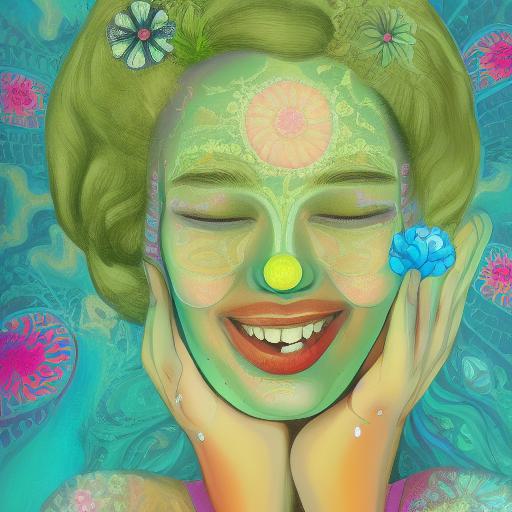How to write this prompt?
Here’s a breakdown of the prompt and how each individual part influences the image being generated:
- “A woman with a laughing flower in her hand is depicted in a psychedelic art style” – This sets the subject matter of the image. The AI will generate an image that features a woman holding a laughing flower, with a colorful and psychedelic art style.
- “The painting has a highly detailed, realistic rendering, showcasing the intricate details of the subject” – This is a specific instruction for the level of detail in the image. The AI will create an image that is highly detailed and realistic, showcasing the intricate details of the woman and the laughing flower.
- “The lighting used in this artwork is an ambient glow, creating a serene and peaceful atmosphere” – This is a specific instruction for the lighting of the image. The AI will create an image that has an ambient glow, creating a serene and peaceful atmosphere.
- “The colors used in this artwork include green, teal, and lime, giving it a natural and earthy feel” – This sets the color palette for the image. The AI will generate an image that features shades of green, teal, and lime, which can create a natural and earthy feel.
Overall, the prompt is a combination of specific instructions and more general suggestions for the AI to follow. Each individual part of the prompt contributes to the overall image being generated. By breaking down the prompt and analyzing each part, you can understand how to write a prompt that effectively communicates your desired image to the AI.
What is the significance of the laughing flower in the image?
The laughing flower is a symbol in the image that represents joy and happiness. Including the laughing flower in the image can create a sense of whimsy and playfulness, which is common in psychedelic art.
How to create a natural and earthy color palette in a painting?
To create a natural and earthy color palette in a painting, you can use colors such as green, brown, and beige. These colors are often associated with nature and can create a calming and soothing atmosphere. Pay attention to the color balance and contrast to create a harmonious and cohesive image.
Who are some famous artists known for creating psychedelic art?
Some famous artists known for creating psychedelic art include Alex Grey, Salvador Dali, and Yayoi Kusama. These artists are known for their use of vibrant colors, abstract patterns, and surreal imagery, which are common elements in psychedelic art.
Do I need to have technical knowledge or programming skills to use AI art generation prompts?
No, you do not need to have technical knowledge or programming skills to use AI art generation prompts. Many AI art generation tools are designed to be user-friendly and accessible, allowing anyone to create AI-generated art without any technical expertise. However, having some basic knowledge of art and design principles can be helpful in creating more effective prompts and in analyzing the generated art.
Are there any copyright issues with using AI-generated art?
Yes, there can be copyright issues with using AI-generated art. The ownership of the copyright in AI-generated art is a complex legal issue, as it involves questions of authorship and originality. In some cases, the copyright in AI-generated art may belong to the person who created the AI algorithm or to the person who trained the AI algorithm. In other cases, the copyright may belong to the person who provided the input or the prompt that the AI used to generate the art.
To avoid any copyright issues, it is important to ensure that you have the necessary rights and permissions to use the AI-generated art. This may involve obtaining permission from the copyright owner or ensuring that the AI tool you are using provides clear guidelines on copyright ownership. Additionally, it is important to be aware of any potential ethical issues surrounding the use of AI-generated art, such as concerns around bias and representation.
Looking to add some cutting-edge creativity to your designs? Look no further than Visual Paradigm Online! With our innovative design tools, you can seamlessly incorporate stunning AI-generated art into your graphics with just a few clicks. Our user-friendly interface and extensive range of design templates and assets make experimentation a breeze, so you can explore countless styles and layouts until you find the perfect combination for your project. Elevate your designs to the next level with Visual Paradigm Online today!


